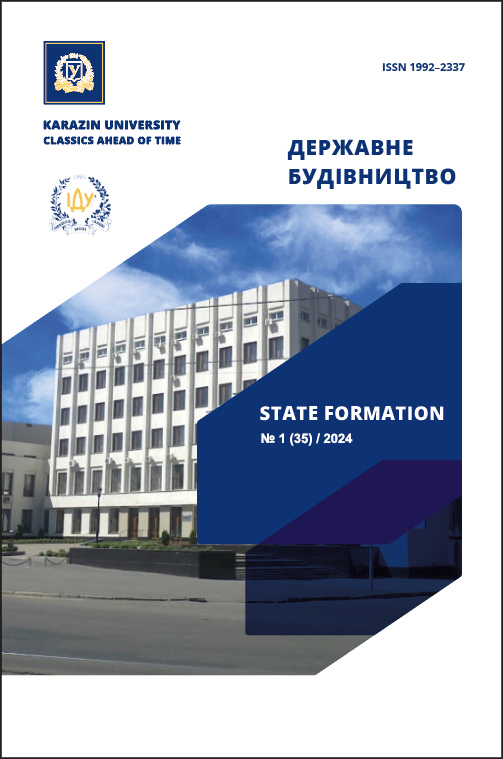Обґрунтування мотивації глобальних цифрових кочівників для залучення їх у післявоєнне промислове відновлення України
Анотація
Стаття пропонує розгляд феномена цифрового кочівництва у ракурсі інтелектуального та трудового ресурсу необхідного для реалізації відновлювальних проекті в українській промисловості регіонів вже сьогодні.
Метою статті є обґрунтування впливу сучасної мотивації глобальних «цифрових кочівників» на формування нового способу залучення у нові приватні і державні проекти післявоєнного відновлення промисловості України. Перша половина статті пропонує аналітичний огляд мотиваційного портрету цифрового кочівника, як рушійної основи побудови механізму залучення їх у спільні відновлювальні проекти, розкриває особливості лідерства та комунікацій в середині системи цифрових кочівників, як основу побудови взаємодії між державою та власниками бізнесу цифрових кочівників. Друга половина статті безпосередньо пропонує авторський погляд на побудову алгоритму роботи з власниками бізнесу цифрових кочівників, розробки механізму залучення їх у спільні проекти з відновлення промисловості регіонів та побудови у подальшому системної роботи зі сталого розвитку регіонів України. Підґрунтям успішної реалізації механізму залучення цифрових кочівників має стати врахування мотиваційної складової та особливостей системи, як основи побудови процесів спільної взаємодії. Вкрай важливим є дотримання принципів раціональність та взаємоповага, уникнення проявів авторитарності та декларативності у взаєминах, розумні межи творчості.
Завантаження
Посилання
DOU. (2023). Tech specialists' choice to stay in Ukraine. URL: https://dou.ua/lenta/articles/tech-specialists-choice-to-stay-in-ukraine/ [in Ukrainian].
Dychkovskyy, S.I. (2021). Global transformations of tourism practices and technologies in the context of the emergence of a digital society (Digital society). [Doctoral dissertation, Kyiv]. URL: http://surl.li/nqwzu [in Ukrainian].
Dunayev, I., Kostennikov, D., & Kushnir, V. (2023). Digital nomads: Global tourists or new labor force for post-war recovery in Ukraine? Pressing problems of public administration, 2 (63), 6–24. DOI: https://doi.org/10.26565/1684-8489-2023-2-01 URL: https://periodicals.karazin. ua/apdu/article/view/23505 [in Ukrainian].
Ovchynnikova, O.V. (2016). Precarious forms of employment of the population: Essence and manifestations. Ukrainian Socium, 1(56), 54–64. DOI: https://doi.org/10.15407/ socium2016.01.054 [in Ukrainian].
DOU. (2023). Ukrainian IT specialists on why they returned from abroad during the war. URL: https://dou.ua/lenta/articles/back-home-during-war/ [in Ukrainian].
DOU. (2023). Would you return to Ukraine? IT specialists who left abroad due to the war tell their stories. URL: https://dou.ua/lenta/articles/it-specialists-return-ukraine/ [in Ukrainian].
Bazylevych, V., Osetsky, V., & Tatomur, I. (2019). Conformity of higher education with requirements of "digital natives". Bulletin of Taras Shevchenko National University of Kyiv: Economics, 1(202), 6–13. URL: http://bulletin-econom.univ.kiev.ua/wp-content/uploads/ 2019/06/202-6-13.pdf
Carnegie Mellon University/Software Engineering Institute. (2005). Body of Knowledge, version 1.0 [Special report].
Bradberry, T., & Greaves, J. (2009). Emotional Intelligence 2.0. Detroit: TalentSmart.
Coleman, J., Butcher, J., & Robert, C. (1988). Abnormal psychology in modern life. Harper-Collins Publishers.
Cook, D. (2022). Breaking the contract: Digital nomads and the state. Critique of Anthropology, 42(3), 304–323. DOI: https://doi.org/10.1177/0308275X221120172
Cook, D. (2023). What is a digital nomad? Definition and taxonomy in the era of mainstream remote work. World Leisure Journal, 65(2), 256–275. DOI: https://doi.org/10.1080/16078055.2023.2190608
DeMarco, T., & Lister, T. (1999). Peopleware: productive projects and teams (2nd ed.). New York: Dorset House Publishing.
Harvey, J.B. (1996). The abilene paradox and other meditations on management. Jossey-Bass.
Janssen, M., & van der Voort, H. (2020). Agile and Adaptive Governance in Crisis Response: Lessons from the COVID-19 pandemic. International Journal of Information Management, 55, 102–180.
Johnson, J. (1995). Chaos: The Dollar Drain of IT Project Failures. Application Development Trends, 2, 41–47. URL: http://surl.li/tmcjf
Luhmann, N. (1995). Social Systems. Stanford University Press.
Patterson, K., Grenny, J., Mcmillan, R., & Switzler, A. (2002). Crucial conversations: tools for talking when stakes are high. McGraw-Hill Contemporary.
Pomeroy-Huff, M., Mullaney, J., Cannon, R., & Sebern, M. (2009). The personal software process (PSP) [Special report CMU/SEI-2009-SR-018]. URL: https://insights.sei.cmu.edu/ documents/1867/2009_003_001_15029.pdf
Project Management Institute. (2013). Practice Standard for Work Breakdown Structures (2nd ed.).
Reichenberger, I. (2018). Digital nomads – a quest for holistic freedom in work and leisure. Annals of Leisure Research, 21(3), 364–380. DOI: https://doi.org/10.1080/11745398.2017. 1358098
Whitehead, R. (2001). Leading a software development team: a developer’s guide to successfully leading people & projects. New York: Addison Wesley.

